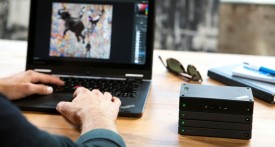Computers naturally degrade over time, but you can improve the longevity of your equipment if you take a few simple steps aimed at boosting speed and performance.
Here are five ways to get more out of your hardware.
1. Tidy up your operating system
The longer you have a computer, the more it will fill up with useless software. More often than not, these are programs that you once used for a project and then forget about. The problem with not removing those programs is they often automatically launch on start-up and take up valuable memory and disk space. For example, Adobe Acrobat auto-launches on start-up but isn't really necessary to run your computer. In System Configuration, you can stop certain apps from running when your operating system boots, saving memory and speeding up your whole system. You should also delete unneeded programs to give yourself more disk space.
2. Clear your browser history
Clearing your browser’s cache to improve speed is still debatable as a browser can more quickly load website images if it has access to them on your hard drive. However, if your computer doesn’t have much disk space or the cache becomes out of date, old or corrupted, then it’s a good time to clear the deck and start again. Corrupted data will interfere with browser performance, while low disk space slows your computer.
3. Upgrade your RAM
Adding RAM to your PC or laptop (when possible) is the simplest performance upgrade you can make. Extra RAM creates a buffer for resource-hungry software and programs. For example, browser software Mozilla Firefox has memory leak issues (which you can fix) and having more RAM makes this less of an issue. More RAM means you can run more background programs and keep more tabs open in your browser. The standard minimum for RAM these days is around 4GB, but you’ll notice a significant performance boost upgrading to 8GB. Gamers, PC enthusiasts and video editors generally work with 16GB to 32GB RAM.
4. Switch to an SSD
Solid-state drives are lightning fast, mainly because they use flash memory over scanning a spinning disk to find your files. SSDs provide an immediate and thorough performance boost – particularly when it comes to boot times. If you don't need large storage space for whatever reason, then an SSD upgrade is definitely the best performance boost you can get on the market, especially when you consider the rapidly decreasing price of flash memory.
5. Check and update your hardware and drivers
One of the major causes of computer slowdown is inefficient cooling of the CPU, which slows its performance to prevent overheating. Cleaning the cooling apparatus, or replacing it, is a great way to improve performance. At the same time, bad or out-of-date drivers are another source of slowdown. Use utilities to monitor issues, such as CPU speed and temperature and hard drive errors, while constantly looking for driver updates to keep everything running smoothly.
PC or laptop performance can always be improved, and following these five steps should keep your computer running better and for longer.
Lenovo offers a broad portfolio of services that can make your IT operations run smoother - and enhance your bottom line. Speak with a Lenovo business specialist today to learn more.














